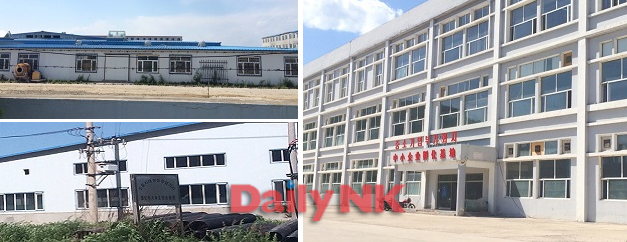Female North Korean laborers dispatched to China’s Liaoning Province, Dandong City are employed at clothing and fisheries factories. They perform difficult work under tough conditions, yet receive a wage of only 100 USD per month. To control the intellectual lives of the workers, they are ordered to participate in criticism and self-criticism sessions, their movements are restricted, and they are subject to surveillance. It is so bad, in fact, that some of the workers express a longing to return to North Korea rather than endure the conditions.
According to a source who works as a trader in Dandong, there are close to 20,000 North Korean laborers working in Dandong, all of whom work long hours and are subject to strict surveillance and control. Under usual circumstances, the laborers stay for a period of three years and receive 100 USD/month. Although this is a humble amount, if the laborers gradually save it up, they can live relatively well upon their return to North Korea. That is why the workers usually choose to continue tolerating the strict system of controls.
The Chinese companies that do business with the North Korean authorities pay an average of 500 USD per month per worker. But this profit gets spread out. First, it goes to the management and surveillance cadres on the site. The cadres tend to pocket about 50-100 USD per worker, per month. The bulk of the proceeds (around 300 USD) get sent to the Party back in North Korea. Finally, the remaining amount (about 100 USD) gets distributed to the individual workers.
Not only are the North Korean laborers’ wages lower than their Chinese counterparts, but the lodging and meals provided to them are also inferior. The Chinese companies are responsible for providing personnel costs, food, lodging, etc. According to the provisions of the contract, these amenities must be provided, so the cadres do their best to avoid incurring any additional costs that might improve work conditions.
One informant, until recently employed as a quality control director at a Dandong fisheries company, said, “The female workers from North Korea usually come into work at around 5:30 a.m. and work for approximately 13 hours per day. In addition, because of the antibacterial policies of the company, the workers wear anti-germ gear, which makes it impossible to speak to one another. So they are forced to focus on work for the entire time.”
“The only time the workers get to relax is during meals, where they are provided with only a few small side dishes, which the workers typically describe as ‘pathetic,’” the source said, adding that most of the factories are located in underdeveloped areas approximately 4-12 kilometers from downtown. Workers live in cramped quarters–approximately 10 to a room– close to the worksite. There are hundreds of people crammed into each building of the lodging facilities.
“I’ve seen plenty of workers get hurt on the job,” the source continued. “Those who wish to miss work or leave early to receive treatment at the hospital need to get permission from their North Korean supervisors. However, North Korean managers receive the personnel fee from the Chinese company in advance and, as such, they are usually quite stingy about giving out even short breaks from the job. There have been North Koreans who were unable to endure the backbreaking labor and ended up requesting to return home, but they were required to continue working until their labor equaled the personnel fee.”
Control and surveillance on the laborers are being intensified, most evident in an increase in self- and mutual criticism sessions. This has resulted in bodily, as well as mental, exhaustion for the workers.
One business person who operates a clothing factory in Dandong said, “I see how fast and well the manufacturers can produce by evaluating a one-day production cycle. That’s how I determine the quota for the next day. While I was on site, I saw the North Korean workers and their managers engage in self-and mutual criticism and sessions on a daily basis. In order to discourage poor craftsmanship and idleness, the underperforming laborers are put on display in front of the whole group as a punishment. The amount of stress that these workers receive from daily interrogations and criticism is alarming.”
He explained that up until just a little while ago, one could see the laborers strolling around the market on the weekend, eating snacks. Nowadays, however, they are only allowed out two days per month. In Russia, the laborers are allowed to travel about in small groups and do part time jobs; however, in Dandong, “neither of those things is really possible,” he noted.
Although it was previously reported that some workers in Dandong send remittances to family back in North Korea on a monthly basis, sources in the region indicate that most workers tend to save up their earnings for three years and then take it all with them upon their return.
“It depends on the manager whether the laborers receive their wages on a monthly basis or as a lump sum upon completion of their three-year contract,” the Dandong factory manager said. “However, sending the money back home is no easy task. If one wants to send a letter or money back home, they will first need approval from their manager. Then the manager will need to do it directly for the worker, and they are not exactly inclined to act quickly on the worker’s behalf. So many workers use the mantra, ‘No news is good news,’ and resist the urge to contact family members back home for three years.”
Although China is participating in this round of particularly strict UN sanctions, the amount of North Korean laborers dispatched to different regions in China has not been reduced. According to multiple business managers with North Korea-facing operations, there are 20,000 North Korean laborers in Dandong, 2,000 in Tumen, and 2,000 in Hunchun. The Chinese authorities can not interfere with the Chinese businesses who have legally hired North Korean laborers. As businesses are legally allowed to hire the cheap workers for up to three years at a time, they are quite pleased.
“In most cases, the workers take a three-year contract and stick with it. They tend to work hard. Business owners who prefer stability perceive that as a positive sign. So the North Korean laborers are popular. These days, the cost of labor for Chinese workers continues to climb, which makes the alternative choice of hiring a North Korean that much easier to make,” the Dandong textiles factory manager explained.
According to a source in Yanju, North Koreans who wish to come and work legally in China must receive a health examination from China’s Board of Health. “The examination center is packed with dozens of North Koreans hoping to pass the inspection,” she said. “The amount who pass on a monthly basis is in the hundreds. The laborers just keep coming.”
*This article has been brought to you with support from the Korea Press Foundation.




















